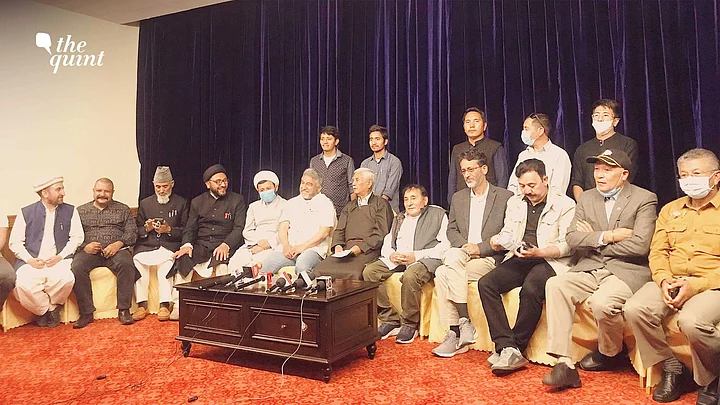Small political constituencies tend to be considerably more complex than big governmentality has the time to examine or the patience to understand.
A case in point is the August 1, 2021 decision of the people of Kargil, represented by the Kargil Democratic Alliance (KDA), and those of Leh, represented by the apex body of People’s Movement for 6th Schedule (ABPMSS), to demand statehood for Ladakh. Their decisions demonstrated political savvy, negotiating skills and compatriot bonding. It was not something that the Bharatiya Janata Party (BJP) had factored in after Delhi’s fateful decision of August 5, 2019, of the derogation Article 370, which dismantled the erstwhile state on this side of the Line of Control.
Tracing The History
But first, a quick historical background to the decision of the political representatives of Leh and Kargil.
Ladakh, which includes both Leh and Kargil, was easily the largest territorial district in India until more than forty years ago. While the two districts occasionally made different choices, there was significant solidarity between them. The political divide between India’s then-largest district began in 1979, when the single district was divided into Leh and Kargil districts, highlighting, respectively, their Buddhist and Muslim majorities. The next step towards the centralisation of Ladakh’s power structure came in 1995, when the two districts were individually designated Ladakh Autonomous Hill Development Councils (LAHDC), along the lines of the Gorkha Hill Council. Leh grabbed it, but Kargil demurred until 2003.
The current demand for Union Territory status was initiated in Leh District during the 2002 Jammu & Kashmir state elections. Translated, this meant a demand for separation from Jammu & Kashmir. Since then, it had become the vocal mainstay of Leh’s political sentiment. Meanwhile, Kargil rejected the demand outright, intuiting, rather than articulating, that the move spelt greater centralisation of political power.
The next milestone was August 5, 2019, when the BJP unilaterally and without consulting the people of the erstwhile state of Jammu and Kashmir, dismantled it. In the days that followed, there was an air of smug satisfaction in New Delhi. Leh celebrated its just declared status as a Union Territory. But Kargil rejected it and even tried to protest, but could not succeed, given a lockdown that was considerably more brutal than the COVID-19 pandemic that followed seven months later.
For the BJP, the opposing reactions did not pose a problem. In fact, its political strategies in both state and national elections have been honed to depend on precisely such divisive reactions, which it efficiently capitalised on, and even more effectively if that divide was along communal lines.
Far-Reaching Effects of The August 5 Move
Since August 5, 2019, there has been an air of a dusted-and-done-deed about the fate of the erstwhile state of Jammu & Kashmir. This is not just within the BJP but even among some Congress leaders, other opposition politicians, and even large segments of civil society. There is plenty of evidence to contradict this hypothesis of denial.
Geopolitically, the dismantling of the erstwhile Jammu & Kashmir state has triggered the ongoing fiasco along India’s entire Himalayan borderland with China, from Ladakh to Arunachal Pradesh. It has even emboldened Nepal and caused Bhutan to hedge on its military reliance on India.
Closer to home, there is even starker evidence that the dispute has not been resolved. In the last two years, the BJP has left Delhi with a legacy of four trouble spots in the erstwhile State. Until two years ago, it could have been argued that New Delhi had just one trouble spot in the region — namely, the valley of Kashmir, which continues to seethe and simmer, notwithstanding the “calm” that everyone would like to pronounce permanent.
Jammu does not lag in disillusionment either. Its political class, economic community and civil society have rapidly recognised that its local politics is now controlled from New Delhi, that its local economy is being encroached by “outsiders”, and that its native land rights have been compromised.
In this context, Ladakh’s reaction to the 2019 move has been the most startling. The recent joint Leh and Kargil meeting expanded the canvas of its demand for New Delhi. In response to the broken promise of a broken “UT status”, which disempowered the people of Ladakh rather than devolve power to them, the representatives asked that it be given the status of a full state with all legislative powers.
In addition, they have also proposed the creation of an additional Member of Parliament and two Rajya Sabha seats to represent Leh and Kargil districts — true and detailed representation.
Will The BJP Get Isolated?
So, it turns out that the derogation of Article 370 may have impacted Ladakh more than Kashmir. This may explain the aggressive stance communicated by Thupstan Chhewang, the President of the Ladakh Buddhist Association, who chaired the meeting. He is reported to have said that even the “Domicile law like the one implemented in J&K is not acceptable to us”.
But the significance of the August 1 resolve is not merely in the demands. It is that for the first time in more than forty years, the people of the two regions have united. Significantly, the BJP members of Ladakh were not present during the entire all-Ladakh meeting due to “prior commitments”. This could mean the isolation of the BJP in Ladakh.
Given the double-boundary region, in which this building resistance is taking place along the LoC and the LAC, does it augur a migraine headache in the future, not just for the BJP but for India?
(The writer is a historian and professor of Central Eurasian history, a political analyst, author and former Vice-Chancellor. This is an opinion piece and the views expressed above are the author’s own. The Quint neither endorses nor is responsible for the same.)
(At The Quint, we question everything. Play an active role in shaping our journalism by becoming a member today.)
